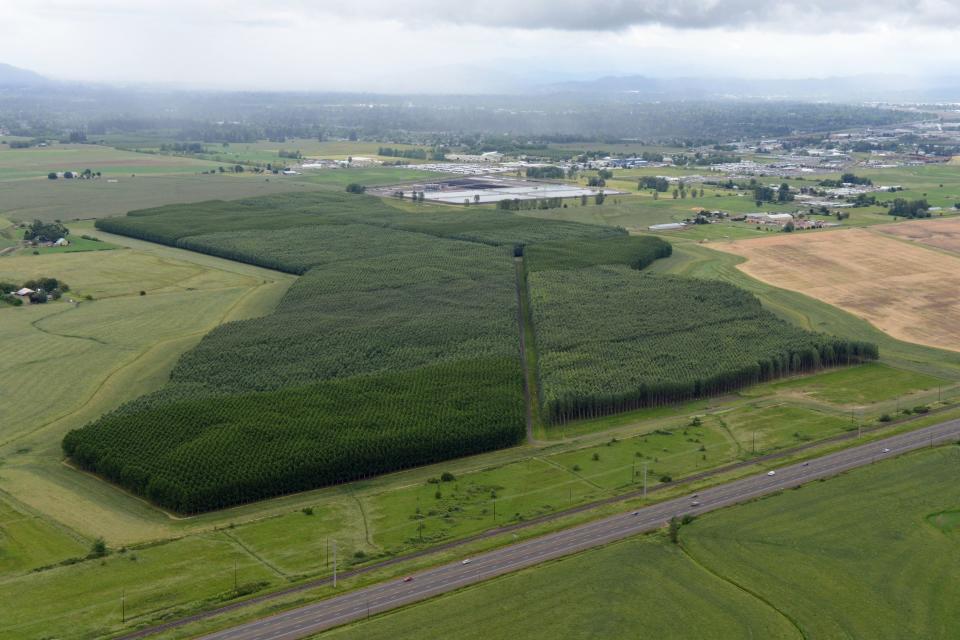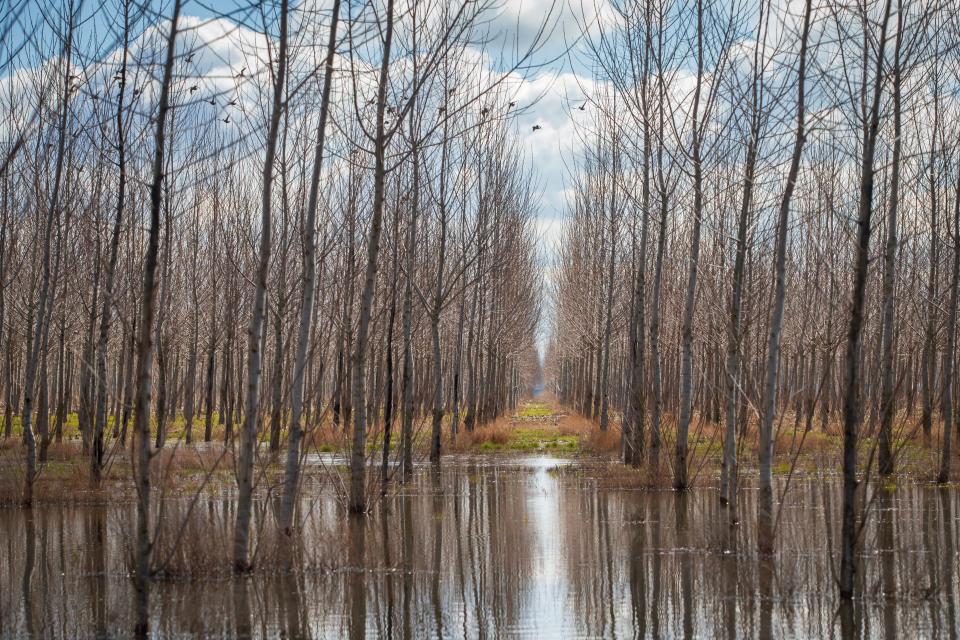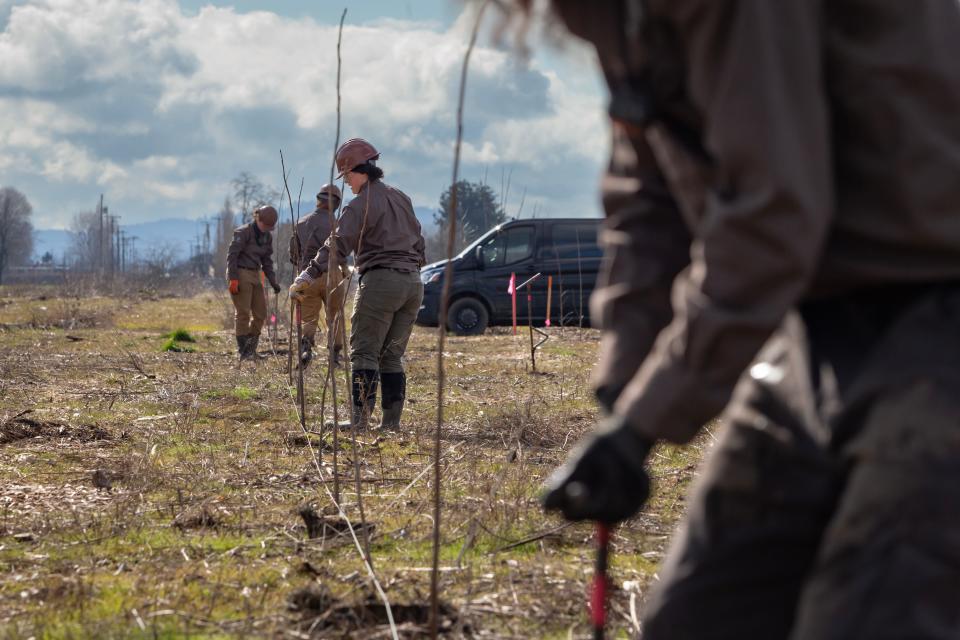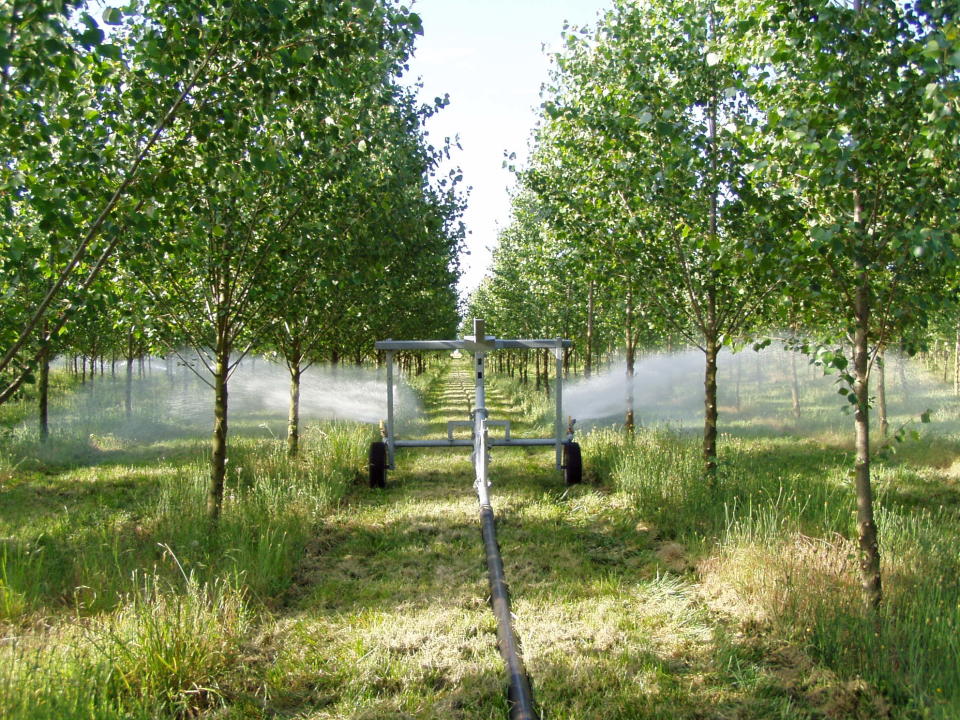From poop to poplars: How biosolids from wastewater help fertilize trees, grass
What you flush down your toilet today could help fertilize poplars or grass in four to five years.
The Metropolitan Wastewater Management Commission uses biosolids as a supercharged fertilizer for the agency’s biocycle farm and local grass seed farms.
The nearly 600-acre biocycle farm has hundreds of acres of poplar trees grown in three units as well as hayfields, grass fields and pasture for sheep.
Biosolids are nutrient-rich organic materials left over after the wastewater treatment process. Using them for land treatment is an environmentally and economically responsible option for disposal, MWMC spokesperson Thomas Gray said.
It helps the agency use the biosolids instead of burning them or putting them in a landfill and creates beneficial partnerships with local farmers and organizations and a revenue source for the farm, Gray and other agency staff said.

Burning them and placing them in the landfill leads to methane release, said Robert Murray, the residuals manager at the Biosolids Management Facility. Applying them as a land treatment is an environmentally friendly option for disposal.
Environmentally friendly option for biosolid disposal
The Metropolitan Wastewater Management Commission is responsible for wastewater treatment in the Eugene-Springfield area. The commission covers areas within Eugene and Springfield's urban growth boundaries and accepts waste from some septic programs, Gray said, but overall handles a small portion of the county's sewage.
It’s a partnership between the two cities and Lane County, with Eugene and Springfield splitting duties. For example, staff from Eugene operate the farm, and staff from Springfield partner with those employees to develop management plans for the farm.
The commission first started planting hybrid poplars at the biocycle farm nearly a decade ago, in 2004. When the three units are fully planted, there are around 50,000 trees in each.

From toilet to tree
Producing the dust-like substance is a yearslong process.
Wastewater from bathrooms, kitchens, laundry rooms, restaurants and more goes to the treatment plant. Once treated, MWMC pipes biosolids and other matter to one of four lagoons at the biosolids facility on Awbrey Lane.
The commission rotates between lagoons in three- or four-year cycles to dredge them and feed tanks that go to the dewatering facility.
Staff adds a polymer to separate solids and water, then what’s left goes through a screening to remove hair and plastics and a squeezing process to get more water out. That produces a “cake” that goes onto a hopper, gets loaded into trucks, and is taken to drying beds.
Crews then rotate the biosolids in the sun all summer until it dries into a dust-like substance that can go on grass fields and the poplars.
The dust is high in nitrogen and phosphorous and “kind of a steroid” for the poplars, Murray said.
Already fast-growing, the poplars easily can grow up to 8 feet a year, said Bryan Robinson, an environmental management analyst for MWMC.
There are just shoots where a Northwest Youth Corps crew is planting now. Other units have enough growth to host a variety of wildlife including voles, deer, coyotes, eagles, hawks and more that call the wetland and forest habitat home.

The commission also partners with local grass seed farmers who apply the biosolids to part of their fields instead of chemical fertilizers, Murray said. He's seen the grass grow faster after application.
MWMC gives the farmers the biosolids for free, but there are revenue opportunities from the farm. The commission harvests the poplars every 10 to 12 years and sells the wood.
Poplar boards from the farm are available for purchase at BRING Recycling, Robinson said.
MWMC has tried a few different things to test the market for the poplar, Gray said. BRING is the latest option, but the commission also has partnered with vendors to make plywood and with Urban Lumber Co. for board cutting.
Northwest Youth Corp crew helping plant thousands of trees
The farm also is an opportunity for partnerships.
A young adult conservation crew from the nonprofit Northwest Youth Corps is clipping shoots from existing poplars and planting them between stump rows. Between early February and mid-April, they’ll have planted thousands of poplars.
The wet season is best for planting because the soil gets hard as it dries and makes it harder to plant, Robinson said.
Youth Corps workers punched evenly spaced holes into the ground then eased in poplar whips. They have to plant the trees in even rows with enough space for equipment. MWMC must be able to roll large, industrial hoses down the rows to water the trees.

MWMC has been happy with the crew’s work, Robinson said.
The nonprofit also has been happy with the partnership, which Executive Director Jeff Parker said adds “critical workforce development and community engagement elements.” In addition to helping plant trees, crew members also get the opportunity to tour MWMC facilities.
“As members of the greater Eugene Springfield community, we are proud to be a part of a project that has so many positive environmental, economic, and youth development outcomes,” Parker said in a statement.
The farm also has partnered with the Oregon State University Extension and is open to other partnerships. There are lots of opportunities on the farm for research, staff said, and MWMC is currently looking at whether the poplars can serve as biochar.
Learn more about the farm
There’s more information on the farm, including an FAQ and timeline, available at mwmcpartners.org/facilities/biocycle-farm/.
Contact city government watchdog Megan Banta at mbanta@registerguard.com Follow her on Twitter @MeganBanta_1.
This article originally appeared on Register-Guard: Agency in Lane County uses leftover sewer organics on biocycle farm

